ECO mode Citroen DS3 2015 1.G Service Manual
[x] Cancel search | Manufacturer: CITROEN, Model Year: 2015, Model line: DS3, Model: Citroen DS3 2015 1.GPages: 415, PDF Size: 11.95 MB
Page 357 of 415
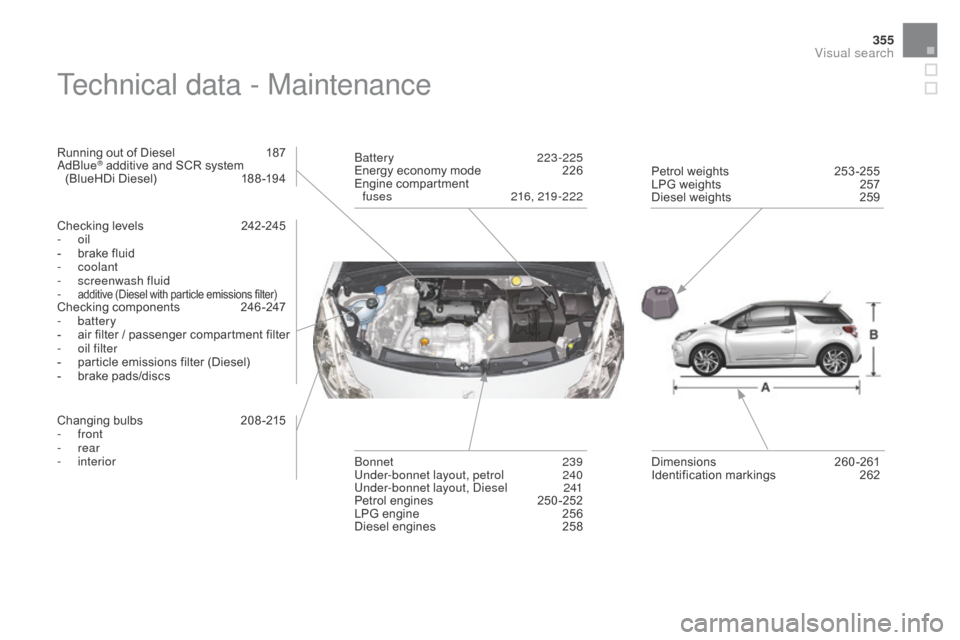
355
DS3_en_Chap12_index-recherche_ed01-2015
Technical data - Maintenance
Running out of Diesel 187
AdBlue® additive and SCR system (
BlueHDi Diesel) 1 88 -194
Checking
levels
2
42-245
-
oil
-
b
rake fluid
-
coolant
-
s
creenwash fluid
-
additive (Diesel with particle emissions filter)Checking components 2 46 -247
- battery
-
a
ir filter / passenger compartment filter
-
o
il filter
-
p
article emissions filter (Diesel)
-
b
rake pads/discs
Changing
bu
lbs
2
08-215
-
front
-
rear
-
interior Battery
2
23-225
Energy economy mode
2
26
Engine
c
ompartment
f
uses
21
6, 219 -222
Bonnet
239
Under-bonnet layout, petrol
2
40
Under-bonnet layout, Diesel
2
41
Petrol
engines
2
50 -252
LPG
engine
2
56
Diesel
engines
2
58Petrol
weights
2
53 -255
LPG weights
2
57
Diesel weights
2
59
Dimensions
26
0-261
Identification
ma
rkings
2
62
Visual search
Page 359 of 415

357
DS3_en_Chap12_index-recherche_ed01-2015
EBA (Emergency braking assistance) .....15 0, 151
Eco-driving ...............................
......................14
Economy
mode
...............................
..............226
Electric window controls
................................. 64
E
lectronic brake force distribution (EBFD)
...15
0
Electronic
eng
ine
i
mmobiliser.................63, 101
Emergency
b
oot
r
elease
................................. 69
E
mergency braking system
..........................1
51
Emergency
c
all
..................................... 14
5, 26 6
Emergency
w
arning
lam
ps
...........................14
4
Emissions
control system, SCR
......3
3, 34, 188
Energy
economy mode
.................................2
26
Engine
c
ompartment
............................ 24
0, 241
Engine
c
ompartment
f
usebox
.......................2
19
Engine,
Diesel
......................... 2
4, 185, 241, 258
Engine
oil
...................................................... 2
42
Engine
oil level indicator
.........................3
9, 242
Engine,
petrol
....................... 1
85, 240, 250, 253
Environment
............... 1
4, 63, 90, 146, 194, 245
Equipment
se
ttings
.....................4
2, 45, 51, 343
Filling
with fuel
...................................... 18
4 -18 6
Fitting
a wheel
...............................
................205
Fittings,
boot
................................................... 96
F
lashing
in
dicators
........................................ 14
4
Foglamps,
f
ront
...............................
......13 2 , 2 11
Foglamps,
re
ar
...................................... 13
2, 213
Fragrance
c
artridge
........................................ 90
F
requency (radio)
................................. 29
4, 295
Front seats
..............................
..................72, 75
Fuel .......................................................... 14, 18 5
Fuel
c
onsumption
............................................ 14
F
uel filler flap
......................................... 18
4, 18 6
Gearbox, automatic ................1 4, 111, 225, 247
Gearbox, e lectronic ........1
4, 106, 116, 225, 247
Gearbox,
m
anual
.................... 1
4, 105, 116, 247
Gear
lever, automatic gearbox
.....................111
G
ear lever, manual gearbox
.........................10
5
Gear
selector,
electronic
ge
arbox
.............................. 1
06, 247
Gear
shift indicator
....................................... 11
5
Glove
box
........................................................ 93
G
rab
han
dles
............................................ 74
, 76
Halogen headlamps ......................................20 8
Hands-free kit .............................. .320, 321, 340
Hazard
w
arning
lam
ps
.................................. 14
4
Head restraints, front
...................................... 73
H
ead restraints, rear
....................................... 77
H
eated seats
...............................
....................73
Heating
................
............................... 83, 84, 86
Height
and reach adjustment,
steering
w
heel
..............................
................78
Hill start assist
............................................... 11
9
Horn ............................................................... 145
Fuel
gauge
........................................
18
, 20, 18 4
Fuel tank................................................
18 4, 18 6
Fusebox,
das
hboard
.....................................
2
17
Fuses
................
.............................................
216Indicators, direction
......................................
14
4
Inflating accessories (using the kit)
..............
19
8
Inflating tyres
..............................
............
14, 26 0
Instrument panel lighting
................................
41
In
strument
p
anels
...............................
......
18, 20
Instrument panel screen
...................
1
8, 20, 115
Interior
f
ittings
...........................................
9
2, 93
Interior lamp
...............................
...................
140
Interior
m
ood
l
ighting
....................................
1
41
Internet
...............
...................................
310, 311
ISOFIX
...............
....................................
178 -18 0
ISOFIX
m
ountings
................................. 178 , 18 0
Jack ............................................................... 200
Jack cable ............................................ 2
98, 337
JACK
socket
...............................
....94, 298, 337
Jukebox
...............
.......................................... 301
Keeping
children safe
...........1
59, 162, 166 -180
Key
in ignition warning
..................................10
3
Key
with remote control
....................6
0 - 63, 101
Labels, identification .....................................2 62
Lamps, front .......................................... 20
8, 210
Lamps,
re
ar
...............................
....................212
Alphabetical index
Page 360 of 415
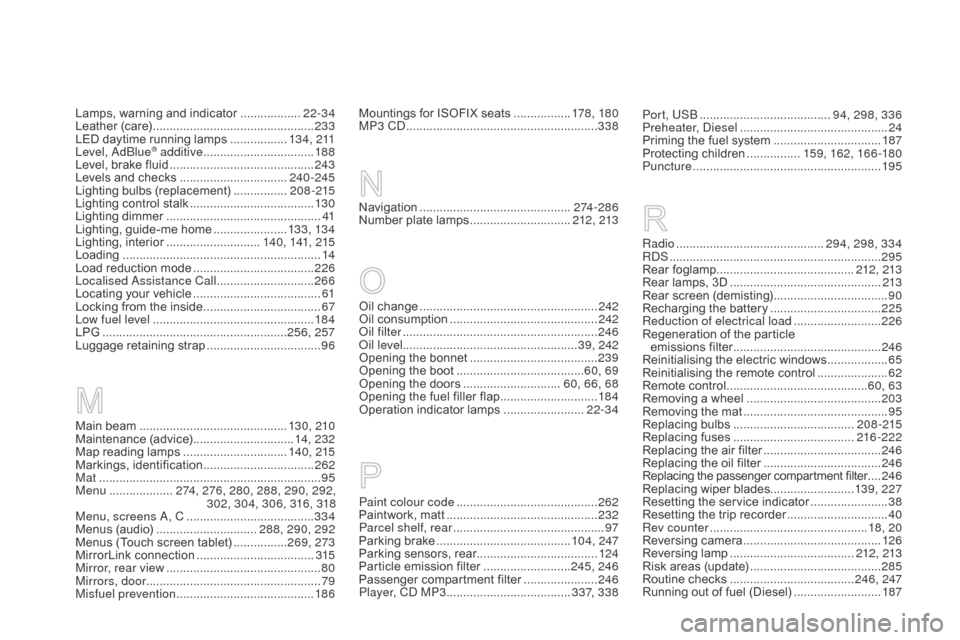
DS3_en_Chap12_index-recherche_ed01-2015
Main beam ............................................13 0, 210
Maintenance ( advice) .............................. 14
, 232
Map
reading lamps
............................... 14
0, 215
Markings,
id
entification
................................. 2
62
Mat
.......
........................................................... 95
Menu
................... 2
74, 276, 280, 288, 290, 292, 302, 304, 306, 316, 318
Menu, screens A, C
...................................... 33
4
Menus
(audio)
.............................. 2
88, 290, 292
Menus
(Touch screen tablet)
................2
69, 273
MirrorLink
c
onnection
................................... 3
15
Mirror, rear view
.............................................. 80
M
irrors, door .................................................... 79
Misfuel prevention
...............................
..........18 6 Mountings
for ISOFIX seats
.................
17
8 , 18 0
MP3 CD
................
.........................................
338
Navigation ............................... ..............2 74 - 2 8 6
Number plate lamps ..............................21
2, 213
Oil
change
...............................
......................242
Oil
consumption
............................................ 2
42
Oil filter
...............
........................................... 246
Oil level .................................................... 39, 242
Opening
the bonnet
...................................... 23
9
Opening
the boot
..............................
........60, 69
Opening
the doors
.............................6
0, 66, 68
Opening
the fuel filler flap
.............................18
4
Operation
indicator lamps
........................2
2-34
Paint colour code ..........................................2 62
Paintwork, matt ............................................. 2
32
Parcel shelf, rear
............................................. 97
P
arking brake
........................................ 1
0 4, 247
Parking
sensors, rear.................................... 124
Particle
emission filter
..........................24
5, 246
Passenger
c
ompartment
f
ilter
......................24
6
Player, CD MP3
...............................
......337, 338 Port, USB
.......................................
9
4, 298, 336
Preheater, Diesel
..............................
..............
24
Priming the fuel system
................................
18
7
Protecting children
................
1
59, 162, 166 -180
Puncture
................
........................................
195
Radio
...............
.............................
294, 298, 334
RDS
................
...............................................
295
Rear
fo
glamp
......................................... 212, 213
Rear lamps, 3D
.............................................
2
13
Rear
s
creen
(
demisting)
..................................
90
R
echarging the battery
.................................
2
25
Reduction of electrical load
.......................... 2
26
Regeneration of the particle
emissions
f
ilter
............................................
24
6
Reinitialising the electric windows
..................
65
R
einitialising the remote control
.....................
62
R
emote control
..........................................
6
0, 63
Removing a wheel
..............................
..........
203
Removing the mat
...............................
............
95
Replacing
bu
lbs
..............................
......
20 8 -215
Replacing
f
uses
..............................
......
216-222
Replacing the air filter
...................................
24
6
Replacing the oil filter
...................................
24
6
Replacing
t
he
p
assenger
c
ompartment
f
ilter
....
24
6
Replacing wiper blades.........................
13 9, 2 27
Resetting the service indicator .......................
38
R esetting the trip recorder ..............................40
R
ev counter
...............................................1
8, 20
Reversing
c
amera
...............................
..........126
Reversing
lam
p
.....................................21
2, 213
Risk
areas (update)
.......................................28
5
Routine
checks
.....................................24
6, 247
Running
out of fuel (Diesel)
..........................18
7
Lamps,
warning
and
indicator
..................
2
2-34
Leather
(
care)
...............................
.................
233
LED
daytime
running
lamps
.................
1
3 4 , 2 11
Level, AdBlue
® additive ................................. 18 8
Level,
brake
fluid ........................................... 24
3
Levels
and
checks
..............................
..240 -245
Lighting
bulbs
(replacement)
................2
0 8 -215
Lighting
control stalk
..................................... 13
0
Lighting
dimmer
..............................
................41
Lighting,
guide-me home
...................... 13
3, 13 4
Lighting,
i
nterior
............................ 14
0, 141, 215
Loading
..............................
............................. 14
Load
reduction mode
.................................... 2
26
Localised Assistance Call
............................. 26
6
Locating
your
vehicle
...................................... 61
L
ocking
from
the inside
................................... 67
L
ow fuel level
..............................
..................18 4
LPG
.......
................................................256, 257
Luggage
retaining strap
.................................. 96
Page 377 of 415
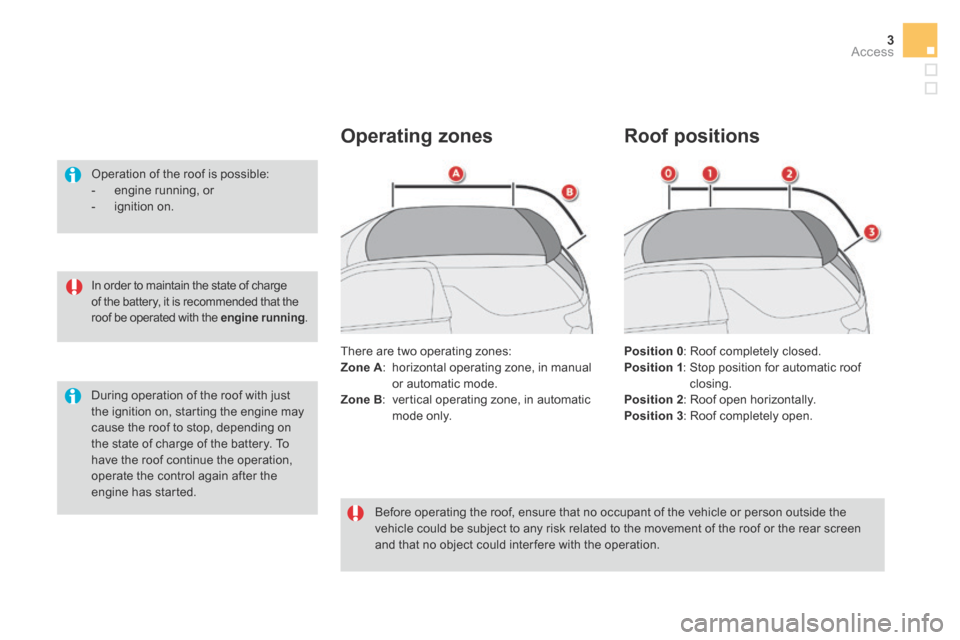
3Access
In order to maintain the state of charge of the battery, it is recommended that the roof be operated with the engine running .
Operation of the roof is possible: - engine running, or - ignition on.
During operation of the roof with just the ignition on, starting the engine may cause the roof to stop, depending on the state of charge of the battery. To have the roof continue the operation, operate the control again after the engine has started.
Operating zones
There are two operating zones: Zone A : horizontal operating zone, in manual or automatic mode. Zone B : vertical operating zone, in automatic mode only.
Before operating the roof, ensure that no occupant of the vehicle or person outside the vehicle could be subject to any risk related to the movement of the roof or the rear screen and that no object could inter fere with the operation.
Roof positions
Position 0 : Roof completely closed. Position 1 : Stop position for automatic roof closing. Position 2 : Roof open horizontally. Position 3 : Roof completely open.
Page 383 of 415
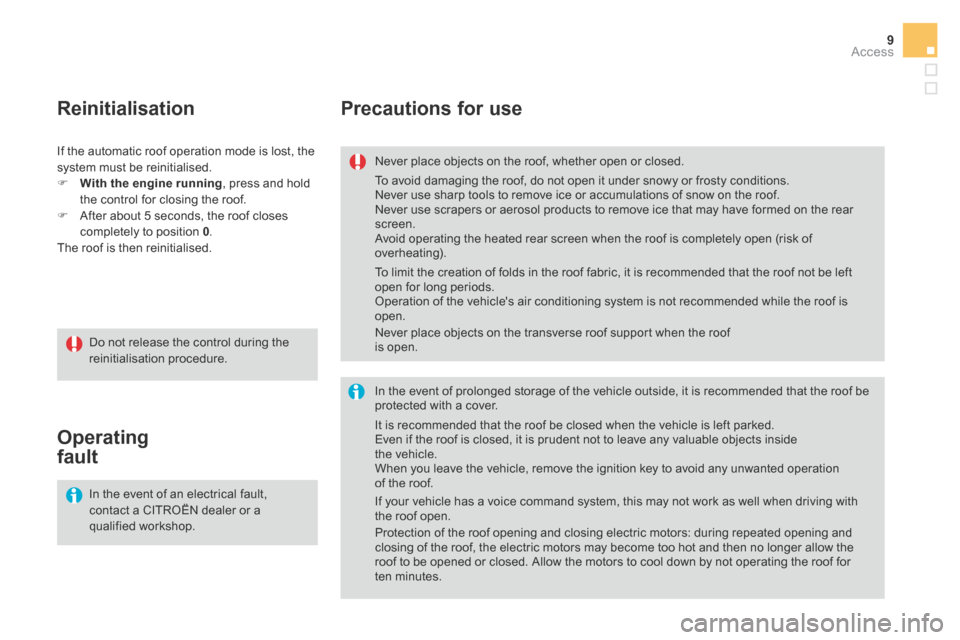
9Access
Precautions for use
Never place objects on the roof, whether open or closed.
In the event of prolonged storage of the vehicle outside, it is recommended that the roof be protected with a cover.
To avoid damaging the roof, do not open it under snowy or frosty conditions. Never use sharp tools to remove ice or accumulations of snow on the roof. Never use scrapers or aerosol products to remove ice that may have formed on the rear screen. Avoid operating the heated rear screen when the roof is completely open (risk of overheating).
To limit the creation of folds in the roof fabric, it is recommended that the roof not be left open for long periods. Operation of the vehicle's air conditioning system is not recommended while the roof is open.
Never place objects on the transverse roof support when the roof is open.
It is recommended that the roof be closed when the vehicle is left parked. Even if the roof is closed, it is prudent not to leave any valuable objects inside the vehicle. When you leave the vehicle, remove the ignition key to avoid any unwanted operation of the roof.
If your vehicle has a voice command system, this may not work as well when driving with the roof open.
Protection of the roof opening and closing electric motors: during repeated opening and closing of the roof, the electric motors may become too hot and then no longer allow the roof to be opened or closed. Allow the motors to cool down by not operating the roof for ten minutes.
Reinitialisation
Do not release the control during the reinitialisation procedure.
Operating
fault
In the event of an electrical fault, contact a CITROËN dealer or a qualified workshop.
If the automatic roof operation mode is lost, the system must be reinitialised. With the engine running , press and hold the control for closing the roof. After about 5 seconds, the roof closes
completely to position 0 . The roof is then reinitialised.
Page 391 of 415
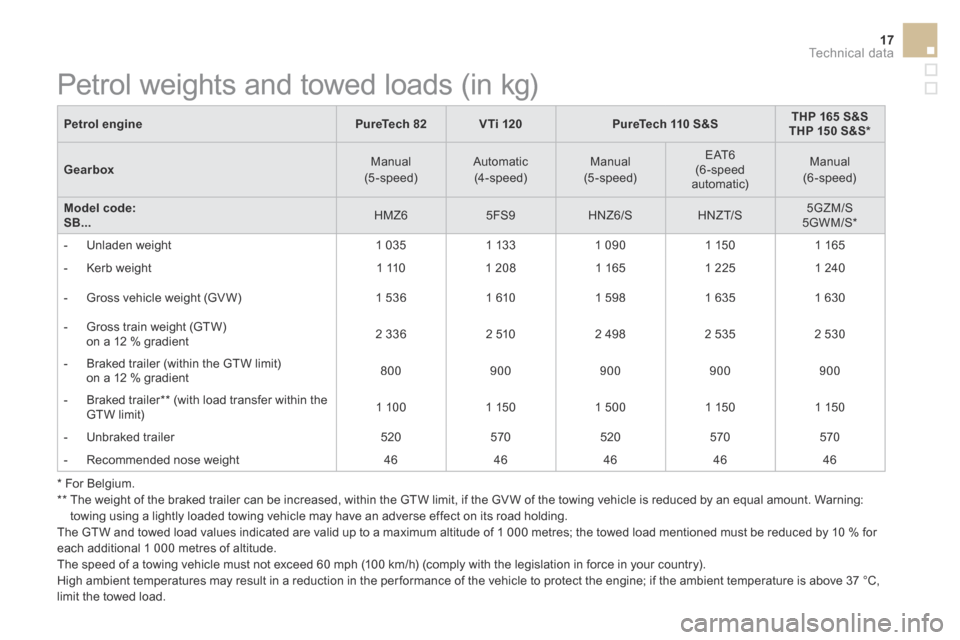
17Technical data
Petrol enginePureTech 82V Ti 120PureTech 110 S&STHP 165 S&STHP 150 S&S *
Gearbox Manual (5-speed) Automatic (4-speed) Manual (5-speed)
E AT 6 (6-speed automatic)
Manual (6-speed)
Model code: SB... HMZ6 5FS9 HNZ6/S H NZ T/S 5GZM/S 5GWM/S *
- Unladen weight 1 035 1 133 1 090 1 150 1 165
- Kerb weight 1 110 1 208 1 165 1 225 1 240
- Gross vehicle weight (GV W) 1 536 1 610 1 598 1 635 1 630
- Gross train weight (GTW) on a 12 % gradient 2 336 2 510 2 498 2 535 2 530
- Braked trailer (within the GTW limit) on a 12 % gradient 800 900 900 900 900
- Braked trailer ** (with load transfer within the GTW limit) 1 100 1 150 1 500 1 150 1 150
- Unbraked trailer 520 570 520 570 570
- Recommended nose weight 46 46 46 46 46
* For Belgium. ** The weight of the braked trailer can be increased, within the GTW limit, if the GV W of the towing vehicle is reduced by an equal amount. Warning: towing using a lightly loaded towing vehicle may have an adverse effect on its road holding.
The GTW and towed load values indicated are valid up to a maximum altitude of 1 000 metres; the towed load mentioned must be reduced by 10 % for each additional 1 000 metres of altitude. The speed of a towing vehicle must not exceed 60 mph (100 km/h) (comply with the legislation in force in your country). High ambient temperatures may result in a reduction in the per formance of the vehicle to protect the engine; if the ambient temperature is above 37 °C,
limit the towed load.
Petrol weights and towed loads (in kg)
Page 393 of 415
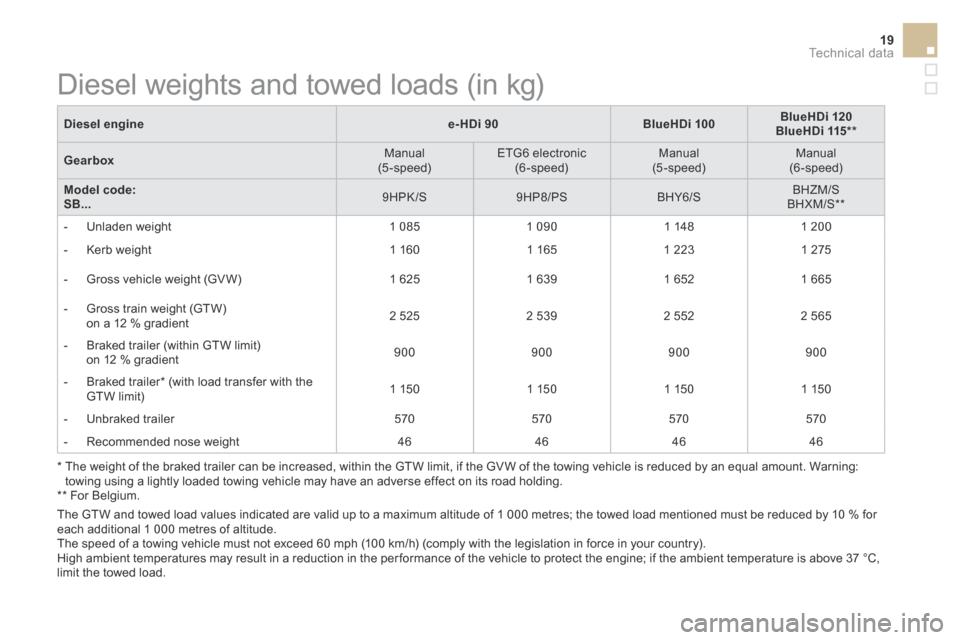
19Technical data
Diesel enginee-HDi 90BlueHDi 100BlueHDi 120BlueHDi 115 **
Gearbox Manual (5-speed) ETG6 electronic (6-speed) Manual (5-speed) Manual (6-speed)
Model code: SB... 9HPK /S 9HP8/PS BHY6/S BHZM/S BHXM/S **
- Unladen weight 1 085 1 090 1 148 1 200
- Kerb weight 1 160 1 165 1 223 1 275
- Gross vehicle weight (GV W) 1 625 1 639 1 652 1 665
- Gross train weight (GTW) on a 12 % gradient 2 525 2 539 2 552 2 565
- Braked trailer (within GTW limit) on 12 % gradient 900 900 900 900
- Braked trailer * (with load transfer with the GTW limit) 1 150 1 150 1 150 1 150
- Unbraked trailer 570 570 570 570
- Recommended nose weight 46 46 46 46
The GTW and towed load values indicated are valid up to a maximum altitude of 1 000 metres; the towed load mentioned must be reduced by 10 % for each additional 1 000 metres of altitude. The speed of a towing vehicle must not exceed 60 mph (100 km/h) (comply with the legislation in force in your country). High ambient temperatures may result in a reduction in the per formance of the vehicle to protect the engine; if the ambient temperature is above 37 °C, limit the towed load.
* The weight of the braked trailer can be increased, within the GTW limit, if the GV W of the towing vehicle is reduced by an equal amount. Warning: towing using a lightly loaded towing vehicle may have an adverse effect on its road holding. ** For Belgium.
Diesel weights and towed loads (in kg)
Page 400 of 415

4Driving
If the selector is not in position P
,
when the driver's door is opened or
approximately 45 seconds after the
ignition is switched off, a warning
message appears in the screen.
�)
Return the selector to position P
;
the message disappears.
When driving on flooded roads or when
crossing a ford, proceed at walking
pace.
Manual operation
�)
Select position M
for sequential
changing
of the six gears.
�)
Move the selector towards the +
sign to
change up a gear.
�)
Move the selector towards the -
sign to
change down a gear.
It is only possible to change from one gear to
another if the vehicle speed and engine speed
permit; other wise, the gearbox will operate
temporarily in automatic mode. This symbol is displayed if a gear
is not engaged correctly (selector
between two positions).
D
disappears and the gears
engaged appear in succession in the
instrument panel.
Stopping the vehicle
Before switching off the engine, you can
engage position P
or N
to place the gearbox in
neutral.
In both cases, apply the parking brake to
immobilise the vehicle.
Invalid value during manual
operation
If the engine speed is too low or too high, the
gear selected flashes for a few seconds, then
the actual gear engaged is displayed.
It is possible to change from position D
(automatic) to position M
(manual) at any time.
When the vehicle is stationary or moving
very slowly, the gearbox engages first gear
automatically. When the ignition is on, the lighting
of this warning lamp, accompanied
Operating fault
by an audible signal and a message in the
multifunction screen, indicates a gearbox fault.
In this case, the gearbox switches to back-up
mode and is locked in 3rd gear. You may feel
a substantial knock when changing from P
to R
and from N
to R
. This will not cause any
damage to the gearbox.
Do not exceed 60 mph (100 km/h), local speed
restrictions permitting.
Contact a CITROËN dealer or a qualified
workshop as soon as possible.
There is a risk of damage to the gearbox:
- if you press the accelerator and
brake pedals at the same time,
- if you force the movement of the
selector from the P
position to
another position when the battery is
flat.
To reduce fuel consumption when at
a prolonged standstill with the engine
running (traffic jam...), put the selector
in the N
position and apply the parking
brake.
Page 401 of 415
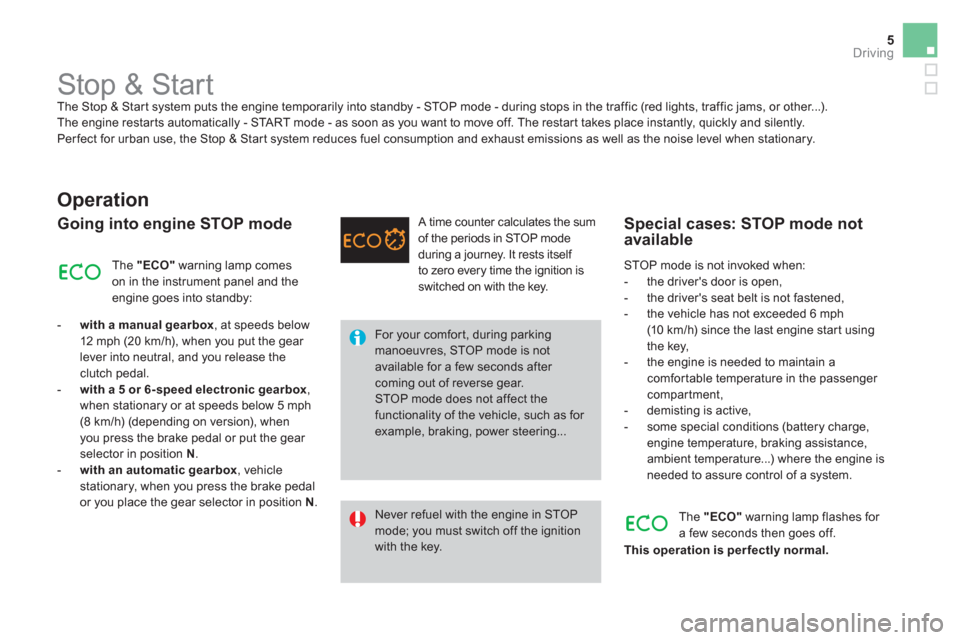
5Driving
Stop & Start
The Stop & Start system puts the engine temporarily into standby - STOP mode - during stops in the traffic (red lights, traffic jams, or other...).
The engine restarts automatically - START mode - as soon as you want to move off. The restart takes place instantly, quickly and silently.
Per fect for urban use, the Stop & Start system reduces fuel consumption and exhaust emissions as well as the noise level when stationary.
Operation
Going into engine STOP mode
For your comfort, during parking
manoeuvres, STOP mode is not
available for a few seconds after
coming out of reverse gear.
STOP mode does not affect the
functionality of the vehicle, such as for
example, braking, power steering...
Never refuel with the engine in STOP
mode; you must switch off the ignition
with the key. The "ECO"
warning lamp comes
on in the instrument panel and the
engine goes into standby:
- with a manual gearbox
, at speeds below
12 mph (20 km/h), when you put the gear
lever into neutral, and you release the
clutch pedal.
- with a 5 or 6-speed electronic gearbox
,
when stationary or at speeds below 5 mph
(8 km/h) (depending on version), when
you press the brake pedal or put the gear
selector in position N
.
- with an automatic gearbox
, vehicle
stationary, when you press the brake pedal
or you place the gear selector in position N
. A time counter calculates the sum
of the periods in STOP mode
during a journey. It rests itself
to zero every time the ignition is
switched on with the key. STOP mode is not invoked when:
- the driver's door is open,
- the driver's seat belt is not fastened,
- the vehicle has not exceeded 6 mph
(10 km/h) since the last engine start using
the key,
- the engine is needed to maintain a
comfortable temperature in the passenger
compartment,
- demisting is active,
- some special conditions (battery charge,
engine temperature, braking assistance,
ambient temperature...) where the engine is
needed to assure control of a system.
Special cases: STOP mode not
available
The "ECO"
warning lamp flashes for
a few seconds then goes off.
This operation is per fectly normal.
Page 402 of 415
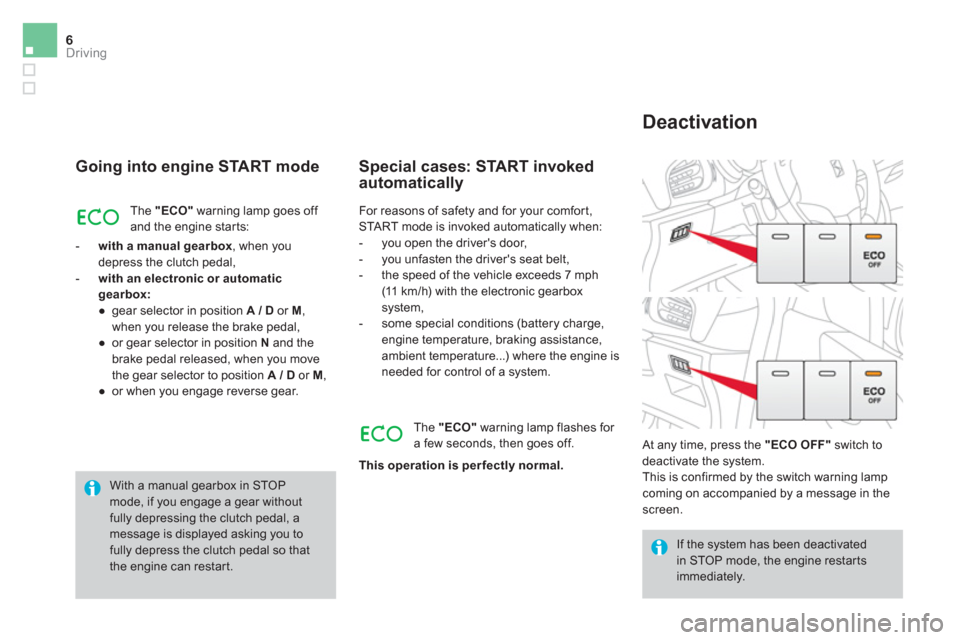
6Driving
Going into engine START mode
The "ECO"
warning lamp goes off
and the engine starts:
- with a manual gearbox
, when you
depress the clutch pedal,
- with an electronic or automatic
gearbox
:
●
gear selector in position A
/ D
or M
,
when you release the brake pedal,
●
or gear selector in position N
and the
brake pedal released, when you move
the gear selector to position A / D
or M
,
●
or when you engage reverse gear.
Special cases: START invoked
automatically
If the system has been deactivated
in STOP mode, the engine restarts
immediately.
At any time, press the "ECO OFF"
switch to
deactivate the system.
This is confirmed by the switch warning lamp
coming on accompanied by a message in the
screen.
Deactivation
For reasons of safety and for your comfort,
START mode is invoked automatically when:
- you open the driver's door,
- you unfasten the driver's seat belt,
- the speed of the vehicle exceeds 7 mph
(11 km/h) with the electronic gearbox
system,
- some special conditions (battery charge,
engine temperature, braking assistance,
ambient temperature...) where the engine is
needed for control of a system.
The "ECO"
warning lamp flashes for
a few seconds, then goes off.
This operation is per fectly normal.
With a manual gearbox in STOP
mode, if you engage a gear without
fully depressing the clutch pedal, a
message is displayed asking you to
fully depress the clutch pedal so that
the engine can restart.